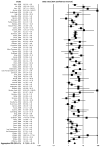Psychological trauma and functional somatic syndromes: a systematic review and meta-analysis
- PMID: 24336429
- PMCID: PMC3894419
- DOI: 10.1097/PSY.0000000000000010
Psychological trauma and functional somatic syndromes: a systematic review and meta-analysis
Abstract
Objective: This meta-analysis systematically examined the association of reported psychological trauma and posttraumatic stress disorder (PTSD) with functional somatic syndromes including fibromyalgia, chronic widespread pain, chronic fatigue syndrome, temporomandibular disorder, and irritable bowel syndrome. Our goals were to determine the overall effect size of the association and to examine moderators of the relationship.
Methods: Literature searches identified 71 studies with a control or comparison group and examined the association of the syndromes with traumatic events including abuse of a psychological, emotional, sexual, or physical nature sustained during childhood or adulthood, combat exposure, or PTSD. A random-effects model was used to estimate the pooled odds ratio and 95% confidence interval. Planned subgroup analyses and meta-regression examined potential moderators.
Results: Individuals who reported exposure to trauma were 2.7 (95% confidence interval = 2.27-3.10) times more likely to have a functional somatic syndrome. This association was robust against both publication bias and the generally low quality of the literature. The magnitude of the association with PTSD was significantly larger than that with sexual or physical abuse. The association of reported trauma with chronic fatigue syndrome was larger than the association with either irritable bowel syndrome or fibromyalgia. Studies using nonvalidated questionnaires or self-report of trauma reported larger associations than did those using validated questionnaires.
Conclusions: Findings are consistent with the hypothesis that traumatic events are associated with an increased prevalence of functional somatic syndromes. The analyses also highlight limitations of the existing literature and emphasize the importance of prospective studies, examining the potential similarities and differences of these conditions, and pursuing hypothesis-driven studies of the mechanisms underlying the link between trauma, PTSD, and functional somatic syndromes.
Keywords: PTSD, meta-analysis; functional somatic syndromes; trauma.
Conflict of interest statement
Figures


References
-
- Barsky AJ, Borus JF. Functional somatic syndromes. Ann Intern Med. 1999;130:910–21. - PubMed
-
- Wessely S, Nimnuan C, Sharpe M. Functional somatic syndromes: one or many? Lancet. 1999;354:936–9. - PubMed
-
- Katon W, Sullivan M, Walker E. Medical symptoms without identified pathology: relationship to psychiatric disorders, childhood and adult trauma, and personality traits. Ann Intern Med. 2001;134:917–25. - PubMed
APPENDIX
Reviewed Articles
-
- Ali A, Toner BB, Stuckless N, Gallop R, Diamant NE, Gould MI, Vidins EI. Emotional abuse, self-blame, and self-silencing in women with irritable bowel syndrome. Psychosom Med. 2000;62:76–82. - PubMed
-
- Amir M, Kaplan Z, Neumann L, Sharabani R, Shani N, Buskila D. Posttraumatic stress disorder, tenderness and fibromyalgia. J Psychosom Res. 1997;42:607–13. - PubMed
-
- Amital D, Fostick L, Polliack ML, Segev S, Zohar J, Rubinow A, Amital H. Posttraumatic stress disorder, tenderness, and fibromyalgia syndrome: are they different entities? J Psychosom Res. 2006;61:663–9. - PubMed
-
- Anderberg UM, Marteinsdottir I, Theorell T, von Knorring L. The impact of life events in female patients with fibromyalgia and in female healthy controls. Eur Psychiatry. 2000;15:295–301. - PubMed
Publication types
MeSH terms
Grants and funding
LinkOut - more resources
Full Text Sources
Other Literature Sources
Medical

